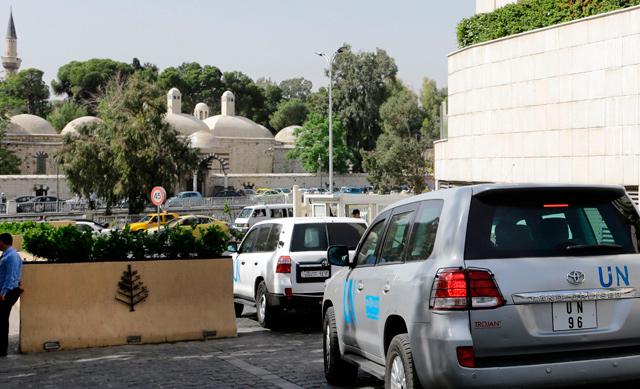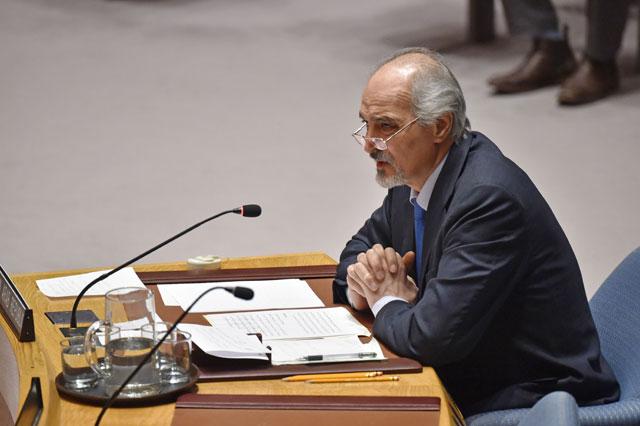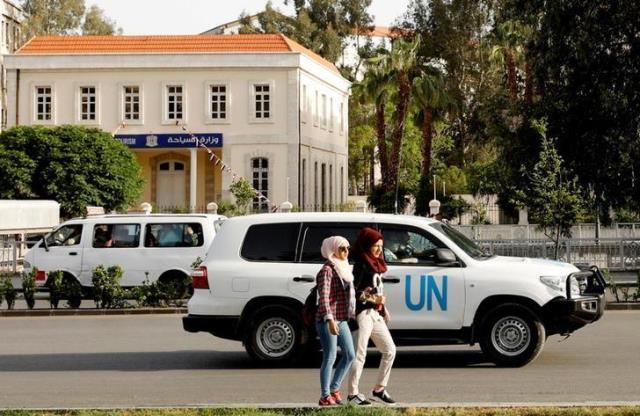You are here
Syria probe mission on hold amid security fears
By AFP - Apr 18,2018 - Last updated at Apr 18,2018

United Nations’ vehicles leave the hotel where the international experts from the Organisation for the Prohibition of Chemical Weapons are staying in Damascus on Wednesday (AFP photo)
BEIRUT, Lebanon — The world’s chemical arms watchdog froze its probe into an alleged chemical attack near Damascus on Wednesday, demanding “unhindered access” after a UN reconnaissance mission came under fire.
Four days after reaching the Syrian capital, OPCW inspectors had yet to begin their field work in Douma, where dozens were killed in a reported gas attack widely blamed on Syria’s government.
The Organisation for the Prohibition of Chemical Weapons (OPCW) said its fact-finding mission (FFM) would stay put in Damascus if its safety was not guaranteed.
Officers from the UN security agency (UNDSS) went on a reconnaissance mission on Tuesday to Douma, a town that was controlled by rebels until Russian-backed regime forces fully retook it last week.
At one of two visited sites, “the team came under small arms fire and an explosive was detonated”, Ahmet Uzumcu, the chief of the Netherlands-based OPCW, said in a statement.
He did not specify who might have opened fire on the UN reconnaissance mission on Tuesday, nor did any other official.
Uzumcu said he would only consider deploying the team to Douma with UNDSS approval and if the inspectors had “unhindered access to the sites”.
“This incident again highlights the highly volatile environment in which the FFM is having to work and the security risks our staff are facing,” he said.
Uzumcu had earlier said Syrian authorities had offered the OPCW interviews with “22 witnesses who could be brought to Damascus” while security issues were worked out.
Syria’s UN ambassador Bashar Jaafari told the Security Council on Tuesday that the OPCW experts would begin their investigation once they received the all-clear from the UN security team.
“If this United Nations security team decides that the situation is sound in Douma, then the fact-finding mission will begin its work in Douma tomorrow,” Jaafari said.
Mission in limbo
Holdout fighters from the Islamist group Jaish Al Islam said an April 7 attack by the regime was carried out with chemical munitions and forced them to accept a transfer deal.
That dashed their hopes of an agreement to remain in Douma and ended a six-year opposition presence in Eastern Ghouta, a semi-rural area within mortar range of central Damascus.
The alleged chemical attack, grisly footage of which shocked the world, prompted a coordinated wave of unprecedented missile strikes by the United States, France and Britain against regime targets.
Syria’s ally Russia was given prior notice and the missiles struck mostly empty buildings, in what many analysts saw as a hollow move that allowed all sides to save face.
The strikes were conducted on the day the OPCW inspectors arrived in the country with a mandate to determine the circumstances of the alleged chemical attack.
Damascus invited the mission and has consistently denied using chemical arms that day. Moscow has relentlessly accused the West and medics in Douma of staging the attack.
Now the future of the mission launched by the OPCW, which won the Nobel Peace Prize during earlier efforts to destroy Syria’s chemical stockpile, looked more uncertain than ever.
“At present, we do not know when the FFM team can be deployed to Douma,” the OPCW chief said.
Western ambassadors to the organisation accused the Syrian regime of obstructing the mission.
Several experts have said it was likely that the Russian and Syrian forces that have controlled Douma over the past week have tried to remove or tampered with any incriminating evidence.
Burial site
The head of the Syrian Civil Defence organisation, known as the “White Helmets”, said he was working closely with the inspectors.
“We provided information on the burial place of those killed in the chemical attack,” Raed Saleh told AFP.
Another member of the White Helmets, whose volunteers were first responders during the deadly two-month bombardment of Eastern Ghouta, said he was concerned inspectors would not be able to conduct their investigation.
“The regime is hiding all the evidence. It is essential they [the inspectors] visit the site of the attack — all the evidence is there. Everything else is secondary,” he said.
“That is where we buried everyone who died in the chemical attack and other bombing,” he added.
Wresting back the Eastern Ghouta opposition stronghold on the doorstep of Damascus had been a priority for the resurgent regime of President Bashar Assad.
Related Articles
THE HAGUE — Experts from the global chemical weapons watchdog are on their way to Syria and will start work on Saturday to probe an alleged
THE HAGUE — A preliminary report by the world’s chemical weapons watchdog said “various chlorinated chemicals” were found at the site of an
THE HAGUE - The arrival of international chemical weapons inspectors at the location of a suspected poison gas attack in the Syrian town of

















